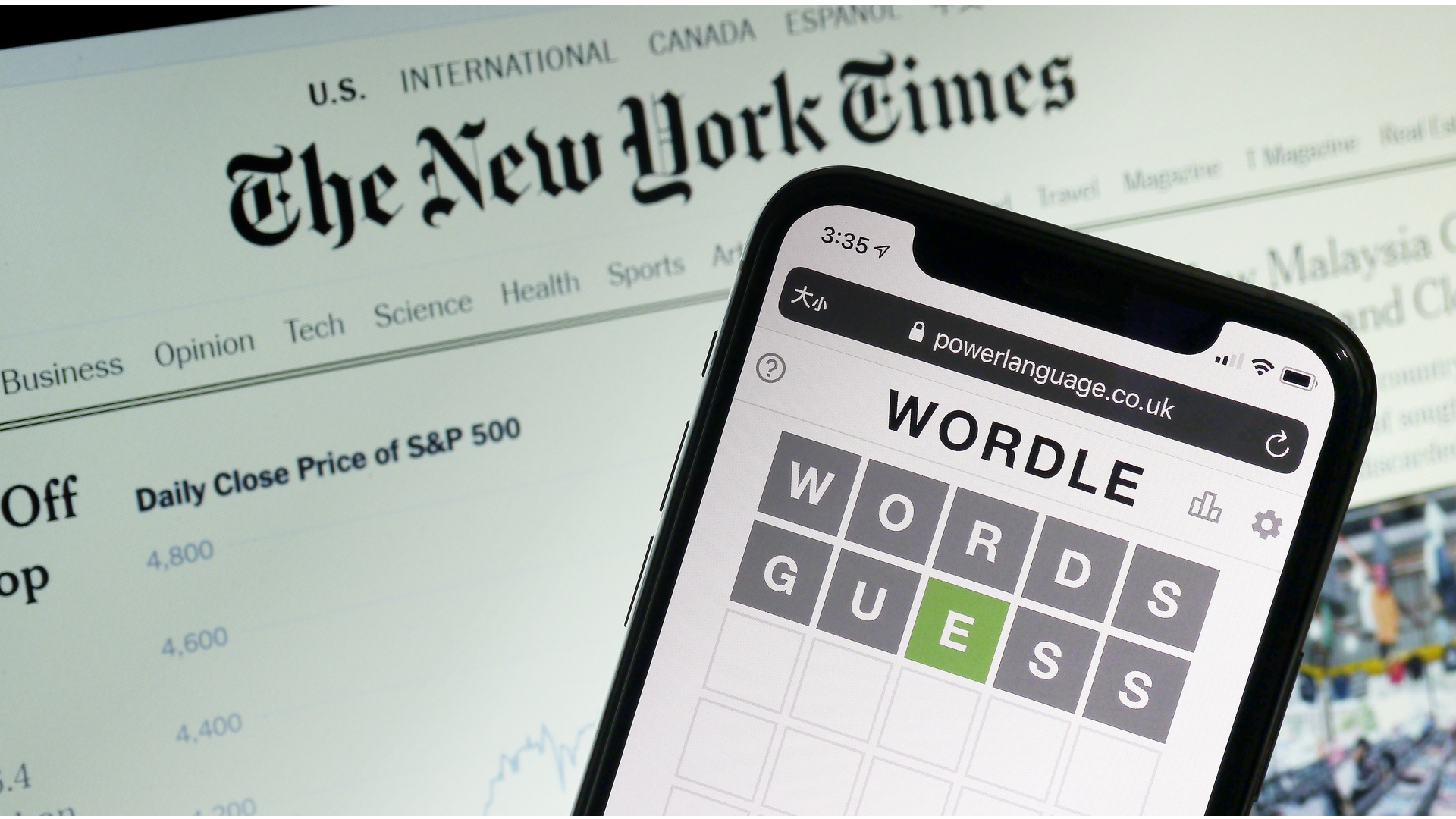Today's Wordle marks the start of a new era for the game - here's why
Wordle enters uncharted territory from today

When the New York Times bought Wordle in February 2022, it assured its millions of players that nothing would change about the game they'd fallen in love with. Wordle would still be Wordle, and most wouldn't even notice any difference.
It remained true to that promise (mostly), but that's all changed with today's puzzle - which sees Wordle enter uncharted territory as far as its answers go. How? Well, today, for the first time since it started 646 days ago, Wordle features a solution that isn't among the 2,000-odd words originally compiled by creator Josh Wardle. Instead, it's been selected by the game's first editor.
To explain what's happened, I'll need to reveal spoilers for today's Wordle - so don't read on if you haven't played yet. (And by all means head over to our Wordle hints page if you haven't, because it's a tough one.)
SPOILERS FOR TODAY'S WORDLE, MONDAY 27 MARCH, FOLLOW BELOW.
An unexpected solution
The change was reported in a Reddit thread, with the poster, u/TrackVol, explaining that a json file within the Wordle site's code listed an "Unexpected solution" for today, March 27, 2023.
click for spoilers
The thread didn't reveal what the answer was beforehand - and I didn't want to know - but it turns out it was a pretty difficult one.
As you'll now know if you've played today's puzzle, it's GUANO, a word that refers to, well, bird poo - or specifically the bird poo of sea birds and bats that is used as a fertilizer. No, this is not your average Wordle answer.
Indeed, it's already causing quite a few problems among players who share their games on Twitter.
Wordle 646 X/6*Not a chance this a.m - not heard of this word 😔 ⬜⬜🟨⬜⬜🟨🟨⬜⬜⬜⬜🟩⬜⬜🟨⬜🟩⬜🟩⬜⬜🟩⬜🟩🟨🟩🟩⬜🟩⬜March 27, 2023
To understand why this is a potentially big moment in Wordle's history, you need to know how the game works.
Sign up for breaking news, reviews, opinion, top tech deals, and more.
When Wardle created Wordle, he gave it a list of 2,315 possible answers. Each of these was assigned to a specific day - with the very first answer, CIGAR, appearing on Saturday, 19 June 2021. (It was game #0, for some reason.) We've got a list of all past Wordle answers if you want to see what followed.
These answers were listed in the game's source code, which was freely available to anyone who knew how to click a few buttons in their browser. Full disclosure: I was among the people who downloaded that list, using it to compile data about what the most common letters in the game are, and what the best Wordle starting words are. (However, I did not look through the list to cheat at the game, with all the grunt work being done by formulae in a spreadsheet. Honest!)
In addition to those 2,000-plus solutions, a further 10,000 or so words were listed as possible guesses. For instance, plurals - which are never possible answers - are included as valid guesses. That means there's nothing stopping you playing HANDS if you want to, so long as you understand that it won't be a correct answer.
That approach makes sense. Wardle didn't want people to be able to just guess ABCDE or XZJQY, because it would make the game too easy. But equally, including 10,000-plus words as possible answers would swing things the other way and arguably make it far too difficult. Balance is everything in Wordle, and Wardle got it spot on.
However, there was no real science behind how the lists were compiled. As Wardle explained in an interview with the New York Times, he initially had a list of more than 12,000 answers - essentially, all five-letter words in the English language. His partner, Palak Shah, then sorted through them all according to whether they were words she knew or not. The winners made it into the eventual list of around 2,000 possible answers.
And so things remained, until the NYT took over the game's stewardship.
The NYT's first step was to remove a bunch of words that it deemed to be offensive, including LYNCH and SLAVE. Over the next few months, the order was also changed a couple of times; these words (including HARRY and FETUS) weren't removed as such, but were bumped down the answer list until the NYT could decide what to do with them.
However, today marks the first day that it has added an answer, rather than removing or reordering one. It's part of a change in approach that presumably stems from the fact that Wordle now has an editor: Tracy Bennett, a former associate puzzle editor for the New York Times, took charge of the game in November.
Bennett has already shaken things up a bit, changing the order of answers more frequently than the NYT had previously done. For instance, on Christmas Day the answer was EXTRA, which wasn't originally the solution set for that day. But until now, she hadn't done anything as drastic as adding a new answer - which begs the question of what this means for the game's future.
Analysis: Is Wordle about to get harder?
At the Game Developers Conference in San Francisco last week, Zoe Bell, Executive Producer of New York Times Games, talked about the publication's first year of owning Wordle. As our sister site PC Gamer reported, Bell revealed that Wordle has massively increased the number of people subscribing to NYT games. She also reiterated NYT's philosophy of "do no harm" regarding Wordle; its owners are not seeking to break the things that have made it so popular.
Adding new answers into the mix won't necessarily do that; after all, most players don't have a clue which words are in the solutions list, and won't particularly care. Even hardcore Wordle geeks like myself would prefer to play it blind and to win (or lose) fairly.
Click to reveal spoiler
But the fact that the new word is a difficult one is worthy of note. (Yes, it's time for another spoiler, so skip past this if you haven't played today).
GUANO is definitely not an easy answer to find: the website Word and Phrase Info states that it's only the 32,382nd most common word in the English language. Yesterday's UNTIE, in contrast, was 14,673rd - and Saturday's VOTER was just 1,456th. Of course, the obscurity of a word is only one of the factors that goes into how hard a given Wordle is, but it's not irrelevant.
That raises the question of why the NYT added it. The only conclusion I can draw is that it was specifically to make the day's puzzle harder. We've been on a run of pretty simple answers lately, a fact I'm confident about because the NYT's WordleBot - an AI designed to help you improve your game - reports the daily average among all those who play it. Of the previous 20 solutions before today, only five had an average score of more than 4/6, commonly seen as par for Wordle.
So, maybe Bennett decided she needed to throw a curveball in there to complicate things a little. But even if that were the case, I would question why she didn't just move a forthcoming answer up the list, unless there's a technical reason why that's hard to do.
What it does suggest is that the very nature of Wordle could be about to change. Rather than answers being truly random, within the parameters set by Wardle when he created it, maybe we're about to enter an era where the game's difficulty is controlled, with far less chance of a run of easy puzzles. In one sense, I'd welcome that - if Wordle is too easy it can lose a lot of its appeal. But it's a hard balance to strike, because if it ends up being too difficult then casual players may well turn away.
It'll be interesting to see what happens over the next weeks and months, but we can at least be sure that it's not a one-off: that Reddit thread also revealed that there'll be a second new answer added in the next few weeks. Good luck on that day.

Marc is TechRadar’s Global Editor in Chief, the latest in a long line of senior editorial roles he’s held in a career that started the week that Google launched (nice of them to mark the occasion). Prior to joining TR, he was UK Editor in Chief on Tom’s Guide, where he oversaw all gaming, streaming, audio, TV, entertainment, how-to and cameras coverage. He's also a former editor of the tech website Stuff and spent five years at the music magazine NME, where his duties mainly involved spoiling other people’s fun. He’s based in London, and has tested and written about phones, tablets, wearables, streaming boxes, smart home devices, Bluetooth speakers, headphones, games, TVs, cameras and pretty much every other type of gadget you can think of. An avid photographer, Marc likes nothing better than taking pictures of very small things (bugs, his daughters) or very big things (distant galaxies). He also enjoys live music, gaming, cycling, and beating Wordle (he authors the daily Wordle today page).